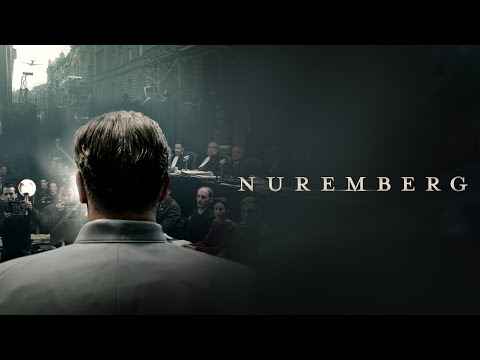Justice cannot just be done. It must be seen to be done. That’s why it was important that the leaders of the Third Reich were not simply shot as enemies but stood public trial for their monstrous crimes. In Nuremberg, writer/director James Vanderbilt’s sober and sobering recreation of the first hearings of the International Military Tribunal in 1945, their sins are rightly re-litigated.
Before the trial, American military psychologist Douglas Kelley (Rami Malek) has his pick of ranking Nazis to study among the 22 indicted men in the first Nuremberg trial: vile offenders such as Robert Ley (Tom Keune), the overseer of the Reich’s slave labor operations; war criminal and Hitler’s successor Admiral Karl Dönitz (Peter Jordan); and propagandist-in-chief Julius Streicher (Dieter Riesle). But the real target is Reichsmarschall Hermann Göring (Russell Crowe): Hitler’s number two, a war ace, family man, and the toughest nut to crack, as Kelley must prove his knowing involvement in the worst of the Reich’s crimes. That sounds simple, but Crowe’s version of Göring is too smart, too consistent, and too adept at presenting himself as a patriot, not a monster.
In their sessions, Vanderbilt’s script veers close to the cat-and-mouse tropes of the serial killer hunter genre created by The Silence of the Lambs and continued to this day through Mindhunter and No Man of God. However, that’s inherent in this perspective on the trial, since he’s adapting The Nazi and the Psychiatrist, Jack El-Hai’s examination of the relationship between Göring and Kelley.
However, it’s a battle on two fronts. While Kelley jousts with Göring, U.S. Supreme Court Justice Robert H. Jackson (Michael Shannon) sets in motion the whole idea of an international tribune. The absurdly high stakes are clearly laid out: If they can’t get convictions, the Nazis walk away in triumph. Worse, if the hearings look like a show trial, they become martyrs, and that’s something Jackson cannot afford.
The full story is too massive to fit into one film, and so just as Stanley Kramer’s 1961 epic Judgment at Nuremberg made simplifications, Vanderbilt’s script tightens up on Kelley’s sparring with Göring, and Jackson fighting with the nebulous geopolitical forces at play. But this means some characters go underserved, such as Colin Hanks as Kelley’s rival, psychologist Gustave Gilbert. Worse may be the miscasting of Richard E. Grant as British prosecuting counsel David Maxwell Fyfe: Grant does the best he can, but the story reduces Fyfe to an alcoholic, and little more than Jackson’s clerk. (At least Fyfe gets a mention: You’ll never hear a French or Soviet accent.)
In simplifying the characters, Vanderbilt seemingly tries to recreate the interwoven dual plots of his earlier look at good men compromising their morals to hunt evil, David Fincher’s Zodiac. There are moments at which he comes close. A midnight meeting between the lawyer and the shrink amid the ruins of the Reichsparteitagsgelände – the 11-acre plaza on which Hitler’s goons paraded and shrieked – truly captures the world-changing gravity of what both men are trying to achieve.
Perhaps Nuremberg would be better as two separate films: Every time the Göring sessions pick up steam – mostly through Crowe’s charismatic, affable depiction of the fiend – some minutiae of the trial intervene. However, Jackson’s side of the story is often underdeveloped, with the complexities of getting all four of the major Allied powers to sign off on the hearings handled at a sprint. The only moment where the scale of the risks he is taking is truly apparent is in a scene where he blackmails Pope Pius XII (Giuseppe Cederna) into supporting the trials.
But Vanderbilt’s real success is in a magic trick, akin to the sleights-of-hand that amateur prestidigitateur Kelley practices in his off moments. In the actual trial, and in the back-and-forth between Jackson and an increasingly red faced Göring on the stand, the illusion of Göring’s plausible deniability collapses. If ever there is a reminder that evil must be punished, publicly and with righteousness, it’s in the dark resolution of Nuremberg.
Nuremberg opens in theatres November 7.
Nuremberg
2025, R, 148 mins. Directed by James Vanderbilt. Starring Rami Malek, Russell Crowe, Michael Shannon, Richard E. Grant, Colin Hanks, Leo Woodall, John Slattery, Giuseppe Cederna, Tom Keune, Peter Jordan, Dieter Riesle.


A note to readers: Bold and uncensored, The Austin Chronicle has been Austin’s independent news source for over 40 years, expressing the community’s political and environmental concerns and supporting its active cultural scene. Now more than ever, we need your support to continue supplying Austin with independent, free press. If real news is important to you, please consider making a donation of $5, $10 or whatever you can afford, to help keep our journalism on stands.

